What is the state of consumer trust in the European agrifood industry?
The EIT Food Trust Report reveals how much trust European consumers have in the agrifood industry and the integrity of food products. Here we highlight the key findings and explore where more work needs to be done to increase trust.
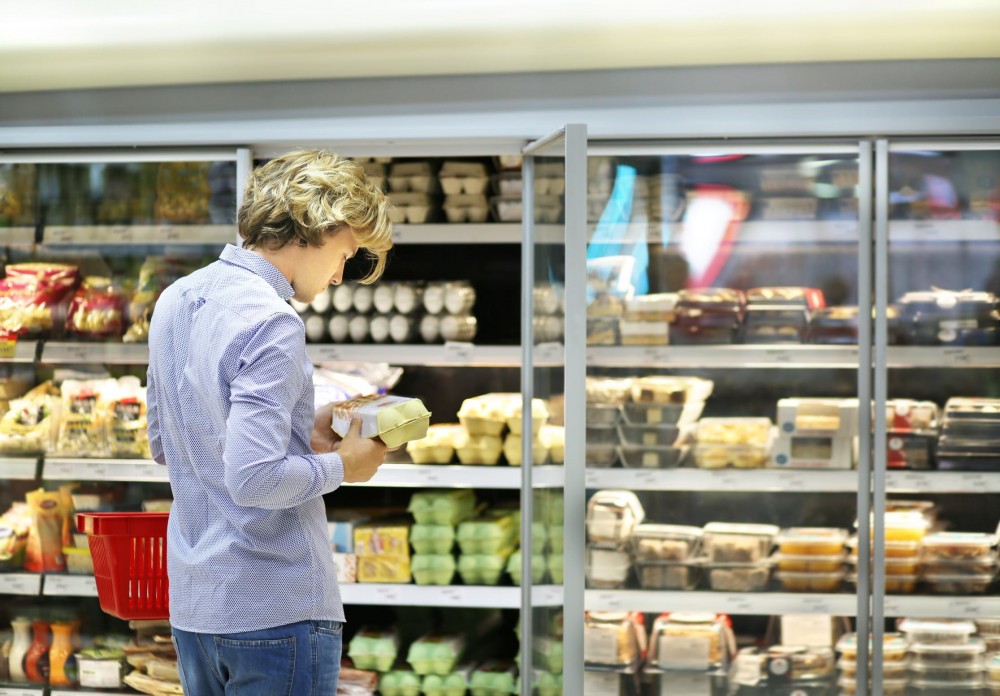
Consumer trust in the agrifood industry is crucial to the transformation of the food system. If we are to improve the health and sustainability of European food, consumers must trust how food is produced, manufactured, distributed, sold and governed, with confidence that information about these processes is both accessible and transparent. Improving transparency would allow consumers to make more informed choices about the health, safety and sustainability of their food, presenting the agrifood industry with opportunities to work alongside them, drive positive change and build trust.
In order to improve consumer trust, it must be measured and tracked. To do this, EIT Food launched the flagship TrustTracker® survey in 2018, an evidence-based, peer reviewed study to map European consumers' trust in the food value chain over time, including beliefs about the competency, care and openness of its actors, and confidence in the integrity of food products. In its first year in 2018, the TrustTracker® surveyed over 5,000 consumers across five European countries, which expanded to over 19,800 consumers across 18 European countries for the 2020 survey.

Do consumers trust the agrifood industry and the integrity of food products?
The 2020 Trust Report shows that consumer trust in all parts of the agrifood industry has increased, with overall rises of between 3% and 8% in those expressing trust (1).
However, despite seven in 10 European consumers claiming they choose healthy options over unhealthy where they can, less than half (43%) believe that food products are generally healthy. On top of this, just four in 10 (40%) have confidence that the food products they buy are genuinely ‘authentic’, meaning they are what they say they are and include the correct, original information on the label. This may have been a greater concern due to the COVID-19 pandemic and the increase in online fraudulent activity (2), but it could also be simply due to an overarching lack of trust for the agrifood industry.
Similarly, just 30% are confident that food products are generally produced in a sustainable way, compared to 42% that consider them to be unsustainable.
This is thought to be at odds with consumer values, with more than three-quarters (76%) of Europeans reporting that they feel a moral obligation to use environmentally friendly products. 60% also said that when given the choice, they will buy sustainable goods over those that are not (1). This demonstrates a clear opportunity to match consumer demand for more environmentally friendly and healthy products, and for the industry to prove that they are acting in the public interest as well as in the interest of the planet.
“The events of 2020 have shown many consumers how vital our food infrastructure is, ranging from keeping products on supermarket shelves to considering how our food production impacts the environment. As we look to our economic recovery in the coming year, helping to build trust between consumers and the food sector will be critical to improving food for everyone.”
Who do European consumers trust the most…and the least?
In a recent Food Fight podcast episode (3), Edward Bergen from Mintel told EIT Food that he believes consumers are generally becoming more trusting thanks to new methods of production being put in the public eye, such as the COVID-19 vaccines, which could improve trust in the agrifood sector as a result. However, for the transformation of the food system to meet the ambitious goals of the EU’s Farm to Fork Strategy, consumers must trust all players within the food value chain with equal weighting in order for food to be truly trusted.
Two thirds of consumers trust farmers
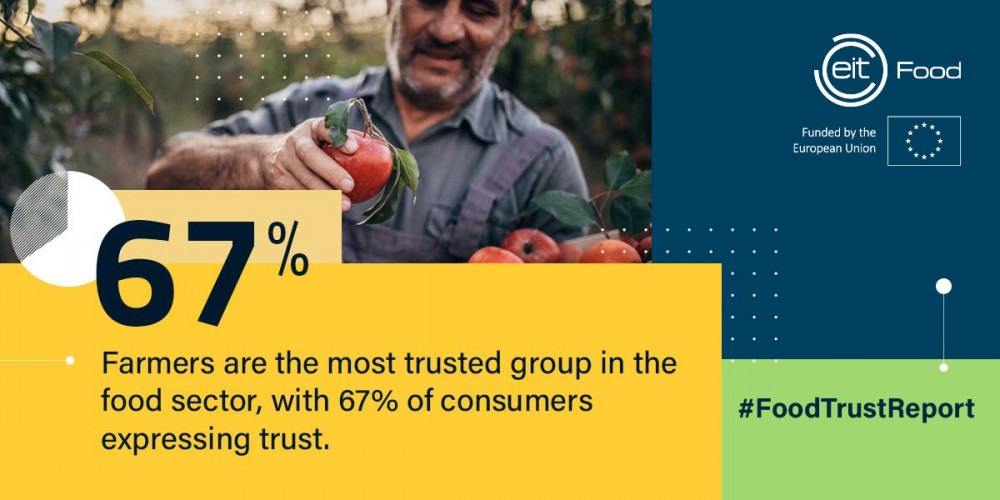
Of all players within the agrifood industry, farmers were recorded as the most trusted by the public, with two thirds (67%) of European consumers reporting that they trust them. When asked about the competency, care and openness of farmers, overall trust for farmers has increased since the first survey in 2018 (1). Two thirds of European consumers (69%) said farmers do a good job in their role in the food system and are competent enough, and over half (56%) said farmers act in the public interest, with the highest score in the UK at 72% (1).
This overall increase in trust for farmers may have been influenced by the fact that more European consumers are buying locally as a result of COVID-19 (4) and have, in many cases, depended on them to source their essential food during isolation periods.
There were also high levels of trust specifically in small farms. Many consumers reported an idealised image of these farmers, calling them ‘custodians of the land’, ‘the backbone of the food industry’, ‘hardworking’, and ‘passionate’. However, there was less trust in larger ‘industrial’ farms, with concerns voiced around intensive farming methods, animal welfare, GMO and the use of chemicals, pesticides and hormones – and a lack of information about these things (1).
What can farmers do to increase trust?
With rising emphasis and consumer demand for sustainable food production (5), consumers are also becoming more aware of the entire food value chain and want to know more about farms and farmers. As part of EIT Food’s Qualitative Study, which engaged with individuals across 12 European countries at the end of 2019 and the beginning of 2020 to better understand the needs, wants, perceptions, intentions, questions, concerns and ideas around food products and the food system, it was suggested that public-facing web pages and more opportunities for people to visit or meet with farmers could increase trust.
It was also noted that consumers find ‘organic’ a helpful insight into the trustworthiness of a product and that large farms need far more transparency and honesty about their processes and practices in order to increase trust.
Over half of consumers trust retailers
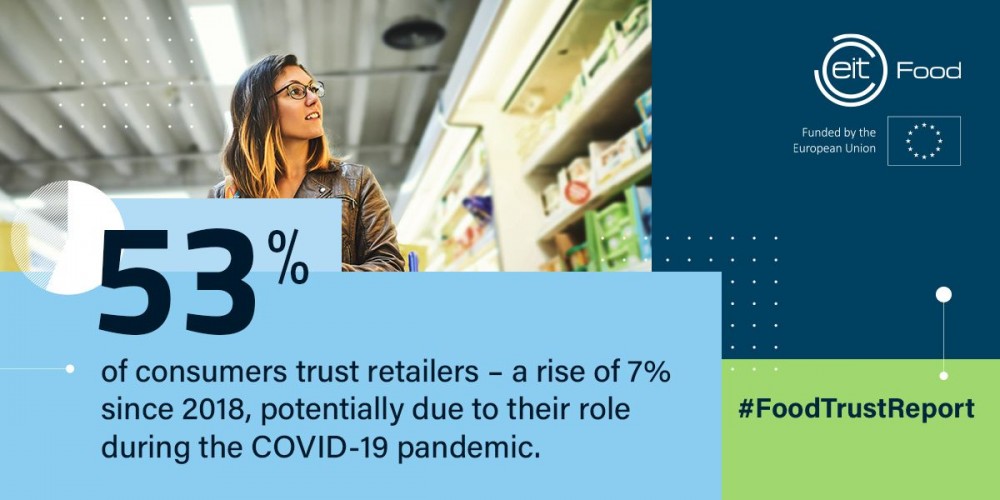
Of all players in the food system, trust for retailers saw the most growth in the two years since the first TrustTracker® survey (+7%), suggesting that the opportunities to build trust in this sector are growing. 53% of consumers expressed trust in retailers (1), which could be associated with the COVID-19 pandemic and the gratitude felt by consumers for the maintenance of food supplies and access during the crisis. Consumers also acknowledged that many retailers are actively trying to adjust to consumer needs and improve sustainability.
For example, the UK supermarket Waitrose, an EIT Food partner, has committed to significantly reducing its environmental impact, including reducing food waste, removing unnecessary packaging and reducing carbon emissions. More than 2,000 Waitrose own-brand products also carry the ‘Good Health’ logo helping customers make more healthy choices (6).
What can retailers do to increase trust?
According to opinions from the Qualitative Study, retailers must listen more to their customers and work directly with them to drive positive change in a way that supports farmers and suppliers. Consumers recorded wanting to see a product range that is more fair trade, local, seasonal and organic – with less packaging and wasteful practices and offers. Consumers also said they want retailers to prioritise affordable, healthy options, increase traceability and take a stand on what they refuse to sell.
Less than half of consumers trust government authorities and manufacturers
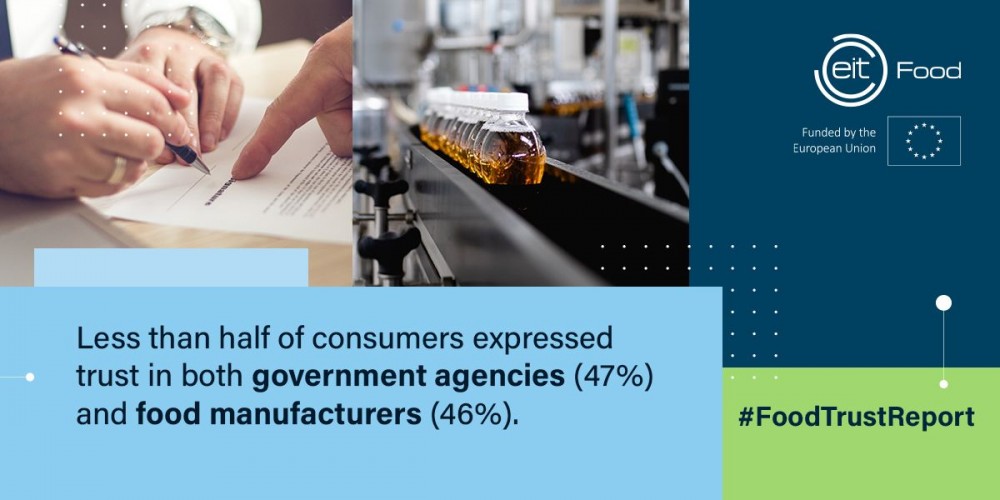
According to the Trust Report, trust in both government agencies and food manufacturers has fallen behind, with less than half of consumers across all 18 countries (47% and 46% respectively) stating that they trust these groups. Over a quarter of consumers actively stated that they distrust government authorities and manufacturers (29% and 26% respectively).
There are a wide range of factors that may have influenced these results, such as the nutrition, safety and environmental impact of foods (7). However, they suggest that consumers are seeking more from government authorities and manufacturers, whether it be transparency, greater accessibility to information or more consumer involvement.
Some consumers saw manufacturers as profit-driven and government authorities as too interest-driven (by policy markets and industry) and distant from the consumer. There were also concerns about mass production of highly processed products with too many artificial additives, too much waste, and misleading claims (1).
What can government authorities and manufacturers do to increase trust?
Talking to EIT Food on a Food Fight podcast episode (8), Anthony Warner - otherwise known as The Angry Chef - said that although we have a food system which is incredibly safe, “there are examples of bad practice” which the agrifood industry needs to call to account to ensure people are well informed about the bad as well as the good.
Consumers in the Qualitative Study highlighted that authorities should have more visibility and transparency, demonstrate their independence and impose harsher sanctions for rule breakers. There was a consensus that authorities should show more leadership and humanity and be proactive to drive change across the food chain for the common good.
In terms of manufacturers, consumers felt that they are not always honest about ingredients, processes and additives. It was suggested that clear, consistent information and language is critical to this, both in their communications and on packaging. Consumers also said they want manufacturers to respond better to changing expectations, such as quality, innovation, sustainability and ethics.
What can the agrifood industry as a whole do to increase trust?
The Qualitative Study revealed that factors such as closer relationships, smaller businesses and shorter value chains were important factors for the agrifood industry as a whole to increase trust.
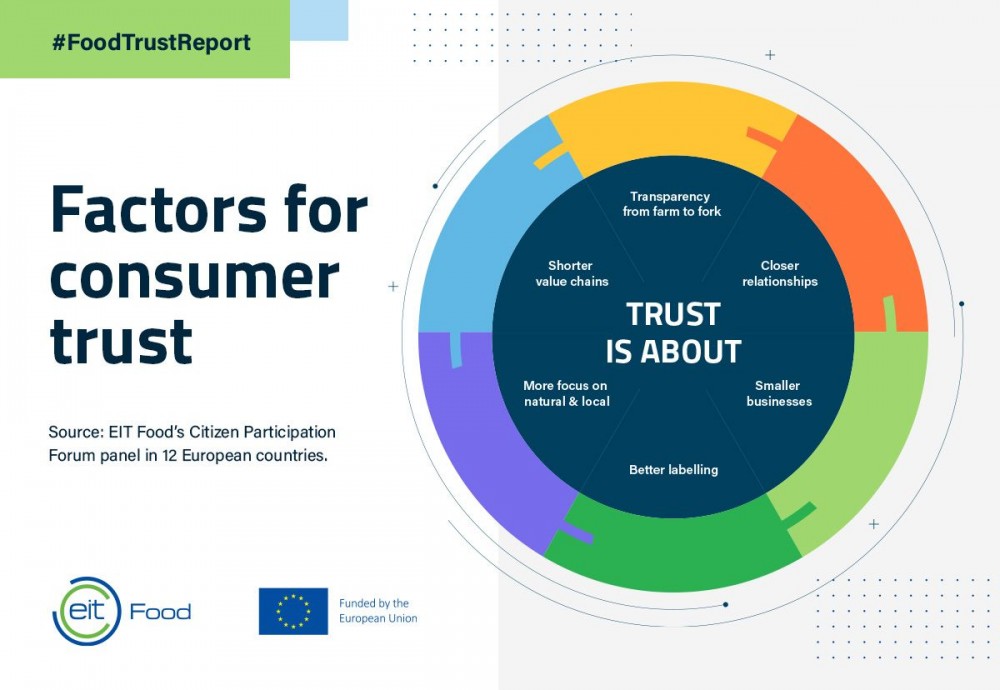
The TrustTracker® survey also revealed that in order for trust to increase, different agrifood players must come together and have an industry-wide approach to trust and transparency. The most important factors highlighted in the Trust Report were openness and honesty, providing consumers with relevant information, listening to people’s concerns, and always acting in the public interest.
The agrifood industry must use insights such as this in order to create tangible solutions and include consumers as active members of the food value chain. It is crucial that these increasing levels of trust are maintained, and consumer demands are met with total transparency and honesty.
An example is the use of digital traceability technologies such as QR codes and blockchain whereby all food value chain players can enter secure information which is then easily accessible to the consumer. Food labelling must also become easy-to-understand and recognisable so that consumers are given validated information, such as through the Soil Association organic certification. Once certified, products receive the stamp of approval, providing consumers with the confidence that the food they are purchasing has passed rigorous tests of their manufacturing processes, sourcing of ingredients, formulation procedures and premises, as well as packaging.
How is EIT Food working to increase trust?
Collaborating to improve consumer trust is a vital part of all EIT Food activities. Connecting different stakeholders, including consumers, to share ideas and information is imperative to our work. EIT Food works with a number of startups and partners working to improve trust, and regularly brings them together on the Food Fight podcast to offer listeners balanced debates about agrifood topics and to discuss solutions to some of the sector’s most pressing challenges such as transparency and trust.
EIT Food's FoodUnfolded public platform reconnects people with the origins of their food, with a mission to unfold how food is produced and to educate and inform about the future of food. FoodUnfolded enables an open dialogue on food between the public, academia, startups and industry, and platforms such as this are increasingly seen as the place to share the latest innovations in our food system and, in turn, increase trust.
Our online courses also allow consumers to take a deep dive into trust, presenting ideas about how to take personal measures to be confident in the food they are buying. Courses are free and range from ‘Engaging with controversies in the food system’ to ‘Trust in our food: understanding food supply systems.’
Direct consumer engagement is also critical. Our Consumer Engagement Labs, for example, brought together senior European consumers aged 65+ with retailers, producers, startups, scientific institutions and NGOs to develop an innovative co-creation methodology. This form of collaboration can be easily adapted to other consumer segments and increase trust by allowing the voice of the consumer to be heard from the creation stage of innovation through to development and rollout.
We encourage you to join our community to learn more about the EIT Food activities and entrepreneurs seeking to improve trust, share your ideas about how to better maintain and increase consumer trust in Europe, and follow updates about the 2021 TrustTracker® survey which will investigate consumer attitudes towards food technologies and novel foods in more detail.
Further reading
- EIT Food: Farmers chosen as most trusted group within the food sector by European consumers
- EIT Food: Can I trust the food industry to provide healthy and sustainable food?
- EIT Food: The Food Fight podcast: Is our food safe?
- EIT Food: The Food Fight podcast: Can we trust the food we eat?
References
- EIT Food: The EIT Food Trust Report
- Europol: 320 tonnes of potentially dangerous dairy products taken off the market in Operation Opson IX targeting food fraud
- EIT Food: The Food Fight podcast: Forecasting the future: the biggest agrifood trends for 2021
- EIT Food: EIT Food report reveals lasting impact of COVID-19 pandemic on European food behaviours
- WEF: We can’t meet the SDGs without improving farmers’ incomes. Here’s why
- John Lewis Partnership: Ethics & sustainability progress report 2019/2020
- Future Learn: Main factors that influence consumer trust in food
- EIT Food: The Food Fight podcast: Can we trust the food we eat?
More blog posts

How Digital Tools Are Supporting Winegrowers: A Test Farms Success Story

From Pitch to Plate: How Football Is Addressing Food Waste
